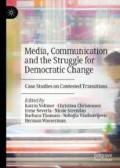Abstract
This chapter seeks to understand how formal and informal leaders forge alliances in democratisation conflicts. It compares case studies from Serbia, Kenya and South Africa—three countries that have recently experienced democratic transitions. Drawing on the concepts of hybrid political arrangements and strategic communication, it unpacks the role of the media in crafting and conveying narratives that bestows legitimacy to some actors through the (re)framing of the past. In doing so, it argues that, far from being observers of the conflict, the media are active participants, shaping other actors’ strategies and contributing to advance some narratives. It also suggests that there is a lurking risk that the state could slide back into authoritarianism or be hollowed out and captured by undemocratic forces.
Access this chapter
Tax calculation will be finalised at checkout
Purchases are for personal use only
Notes
- 1.
Interviews quoted are coded as follows: Country code (EGY = Egypt, KEN = Kenya, SER = Serbia, RSA = South Africa), type of interviewee (Jour = journalist, Act = civil society activist, Pol = political actor), number of interview in sample.
References
Almond, G., & Verba, S. (1989). The Civic Culture: Political Attitudes and Democracy in Five Nations. Newbury Park, CA: Sage.
Bagayoko, N., Hutchful, E., & Luckham, R. (2016). Hybrid Security Governance in Africa: Rethinking the Foundations of Security, Justice and Legitimate Public Authority. Conflict, Security & Development, 16(1), 1–32.
Beresford, A. (2015). Power, Patronage, and Gatekeeper Politics in South Africa. African Affairs, 114(455), 226–248.
Bierschenk, T., & Olivier de Sardan, J.-P. (1997). Local Powers and a Distant State in Rural Central African Republic. The Journal of Modern African Studies, 35(3), 441–468.
Bose, S., & Motwani, N. (2014). The Limits of ‘Hybrid Governance’ in Afghanistan. Strategic Analysis, 38(4), 416–426.
De Waal, A. (2015). The Real Politics of the Horn of Africa: Money, War and the Business of Power. John Wiley & Sons.
Diamond, L. (2002). Elections without Democracy: Thinking about Hybrid Regimes. Journal of Democracy, 13(2), 21–35.
Faris, D. M. (2013). Deep State, Deep Crisis: Egypt and American Policy. Middle East Policy, 20(4), 99–110.
Gingeras, R. (2011). In the Hunt for the “Sultans of Smack:” Dope, Gangsters and the Construction of the Turkish Deep State. Middle East Journal, 65(3), 426–441.
Hagmann, T., & Péclard, D. (2010). Negotiating Statehood: Dynamics of Power and Domination in Africa. Development and Change, 41(4), 539–562.
Hallahan, K., Holtzhausen, D., van Ruler, B., Verčič, D., & Sriramesh, K. (2007). Defining Strategic Communication. International Journal of Strategic Communication, 1(1), 3–35.
Hoehne, M. V. (2013). Limits of Hybrid Political Orders: The Case of Somaliland. Journal of Eastern African Studies, 7(2), 199–217.
Iazzolino, G., & Stremlau, N. (2017). New Media and Governance in Conflict. Third World Quarterly, 38(10), 2242–2257.
Kelsall, T. (2008). Going with the Grain in African Development? Development Policy Review, 26(6), 627–655.
Kelsall, T. (2012). Neo-Patrimonialism, Rent-Seeking and Development: Going with the Grain? New Political Economy, 17(5), 677–682.
Krstić, A., Parry, K., & Aiello, G. (2017). Visualising the Politics of Appearance in Times of Democratisation: An Analysis of the 2010 Belgrade Pride Parade Television Coverage. European Journal of Cultural Studies. https://doi.org/10.1177/1367549417743042.
Lipset, S. M. (1959). Some Social Requisites of Democracy: Economic Development and Political Development. American Political Science Review, 53(1), 69–105.
Luckham, R., & Kirk, T. (2013). The Two Faces of Security in Hybrid Political Orders: A Framework for Analysis and Research. Stability, 2(2), 1–30.
Miskimmon, A., O’Loughlin, B., & Roselle, L. (Eds.). (2014). Strategic Narratives in International Relations. Ann Arbor: University of Michigan Press.
Price, M., & Stremlau, N. (2012). Media and Transitional Justice: Toward a Systematic Approach. International Journal of Communication, 6, 1077–1099.
Price, M., & Stremlau, N. (2015). Strategic Communication and the Avoidance of Violent Conflict. In J. Hoffmann & V. Hawkins (Eds.), Communication and Peace: Mapping an Emerging Field. London: Routledge.
Robertson, G. B. (2010). The Politics of Protest in Hybrid Regimes: Managing Dissent in Post-Communist Russia. Cambridge: Cambridge University Press.
Rocha Menocal, A., Fritz, V., & Rakner, L. (2008). Hybrid Regimes and the Challenges of Deepening and Sustaining Democracy in Developing Countries 1. South African Journal of International Affairs, 15(1), 29–40.
Roselle, L., Miskimmon, A., & O’Loughlin, B. (2014). Strategic Narrative: A New Means to Understand Soft Power. Media, War & Conflict, 7(1), 70–84.
Schedler, A. (1998). What is Democratic Consolidation? Journal of Democracy, 9(2), 91–107.
Söyler, M. (2013). Informal Institutions, Forms of State and Democracy: The Turkish Deep State. Democratization, 20(2), 310–334.
Stel, N., & van der Borgh, C. (2017). Political Parties and Minority Governance in Hybrid Political Orders: Reflections from Lebanon’s Palestinian Settlements and Kosovo’s Serbian Enclaves. Journal of Intervention and Statebuilding, 11(4), 490–510.
Voltmer, K., & Kraetzschmar, H. (2015, June). Investigating the Media and Democratisation Conflicts. MeCoDem Working Paper.
Von Soest, C., & Grauvogel, J. (2015). How Do Non-Democratic Regimes Claim Legitimacy? Comparative Insights from Post-Soviet Countries. GIGA Working Papers, 277. Retrieved from https://www.giga-hamburg.de/en/system/files/publications/wp-277-online.pdf.
Wickham-Crowley, T. (1987). The Rise (and Sometimes Fall) of Guerrilla Governments in Latin America. Sociological Forum, 2(3), 473–499.
Author information
Authors and Affiliations
Corresponding author
Editor information
Editors and Affiliations
Rights and permissions
Copyright information
© 2019 The Author(s)
About this chapter
Cite this chapter
Iazzolino, G., Stremlau, N. (2019). Hybrid Governance, Strategic Communication and the Quest for Institutional Legitimacy. In: Voltmer, K., et al. Media, Communication and the Struggle for Democratic Change. Palgrave Macmillan, Cham. https://doi.org/10.1007/978-3-030-16748-6_8
Download citation
DOI: https://doi.org/10.1007/978-3-030-16748-6_8
Published:
Publisher Name: Palgrave Macmillan, Cham
Print ISBN: 978-3-030-16747-9
Online ISBN: 978-3-030-16748-6
eBook Packages: Literature, Cultural and Media StudiesLiterature, Cultural and Media Studies (R0)

